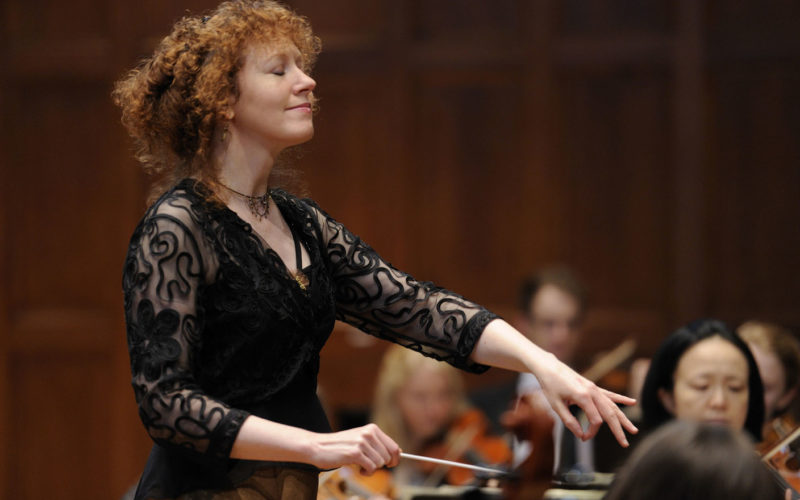“Our music came from a time when society was quite hierarchical, so some of the music that we play was intended for the palace. But we also play music that was intended for the common people in the countryside and the caverns.
“Musicians in the 18th century were servants of the palace, usually. And we are grateful that we are not servants in modern society. But the fact is that a group like Apollo’s Fire is dependent on generous patrons of the arts. And even the fact that we’re playing in the Walton … Arts Center, and that is a project of the Walton Family Foundation — so, there you have one of the world’s wealthiest families who decided to give this facility to the arts. That is a very 18th century, kind of Baroque thing to do. It’s an interesting area for thought.”
— Jeannette Sorrell, artistic director and conductor of Apollo’s Fire.
__
Emotional, moods, descriptive, rhetoric, storytelling.
These are words that come up again and again in a conversation with Jeannette Sorrell, the artistic director and Grammy Award-winning conductor of Cleveland’s Baroque orchestra Apollo’s Fire.
“People tend to think that they don’t like Baroque music because they’ve heard it played badly,” Sorrell poses. “In a sense, we are evangelists. We are here to let people see that Baroque music is different than what they thought it was — and if we send them out at the end feeling better than when they arrived, then we’ve done a good night’s work.”
That evangelism must be successful. Since the ensemble’s founding nearly 30 years ago, Apollo’s Fire has made Cleveland one of the epicenters of Baroque music. The city, Sorrell reveals, along with Boston and San Francisco, are home to the country’s three largest Baroque audiences.
That means, she points out, more people are coming to see Baroque concerts in Cleveland than even New York City. And what they find is an ensemble of specialists on period instruments who have become a pillar of the Cleveland artistic community and internationally touring champions of the musical style.
“Our concert may evoke some feelings about license in the old world and the 18th century, which had both advantages and disadvantages,” Sorrell offers. “People had a much closer relationship with nature at that time. And that really comes through in the ‘Four Seasons.’ These people who lived in the countryside of Italy, their lives were closely intertwined with the cycle of nature, and it was a very joyous thing.”
Eighteenth century Italian composer Antonio Vivaldi’s iconic “Four Seasons” concerto is perhaps the perfect orchestration to demonstrate the virtuosic ensemble’s signature stylings. Though “Four Seasons” is a work many believe they are familiar with, Sorrell assures the rendition by Apollo’s Fire presents the music in a completely refreshing way.
Though the audience can’t see it, Vivaldi’s score that gives musical expression to each season of the year includes annotations and notes from the composer on exactly how to depict the story within the music. A shepherd boy who is crying in fear of the approaching thunderstorm; a farmer who is getting a little bit tipsy at a party celebrating the harvest; a barking dog — these moments are given very specific sound effects and help to make the experience of Apollo’s Fire’s performance a visceral one.
“Baroque music is, I think, quite a different experience for the audience than other kinds of classical music because if you follow what music writers talked about at the time, they all said that music was meant to move the emotions of the listeners,” Sorrell shares. “The role of the performer was to affect the emotional moods of the listeners. And Apollo’s Fire, we are kind of obsessed with that particular emphasis.
“We really are very focused on conveying the emotional mood of each phrase, and being really clear in what we project out to the audience based on what is going on in the text and the story. So the music becomes in service of the story that’s being told.”
JOCELYN MURPHY
jmurphy@nwadg.com
__
FAQ
Apollo’s Fire:
‘Vivaldi’s Four Seasons: Rediscovered’
WHEN — 8 p.m. Feb. 29
WHERE — Walton Arts Center in Fayetteville
COST — $10
INFO — 443-5600, waltonartscenter.org, apollosfire.org










